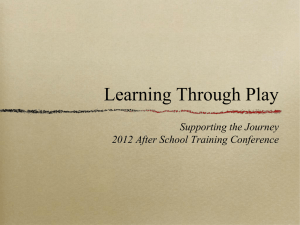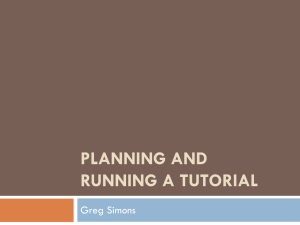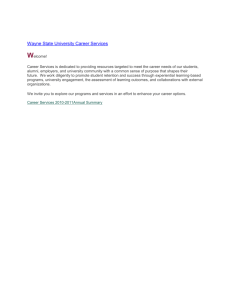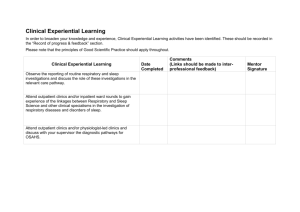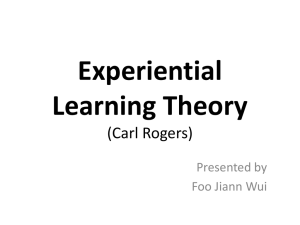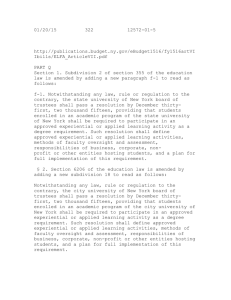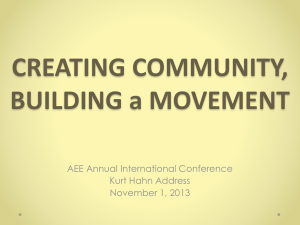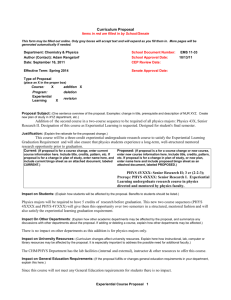Philosophy & Theory of Experiential Education
advertisement
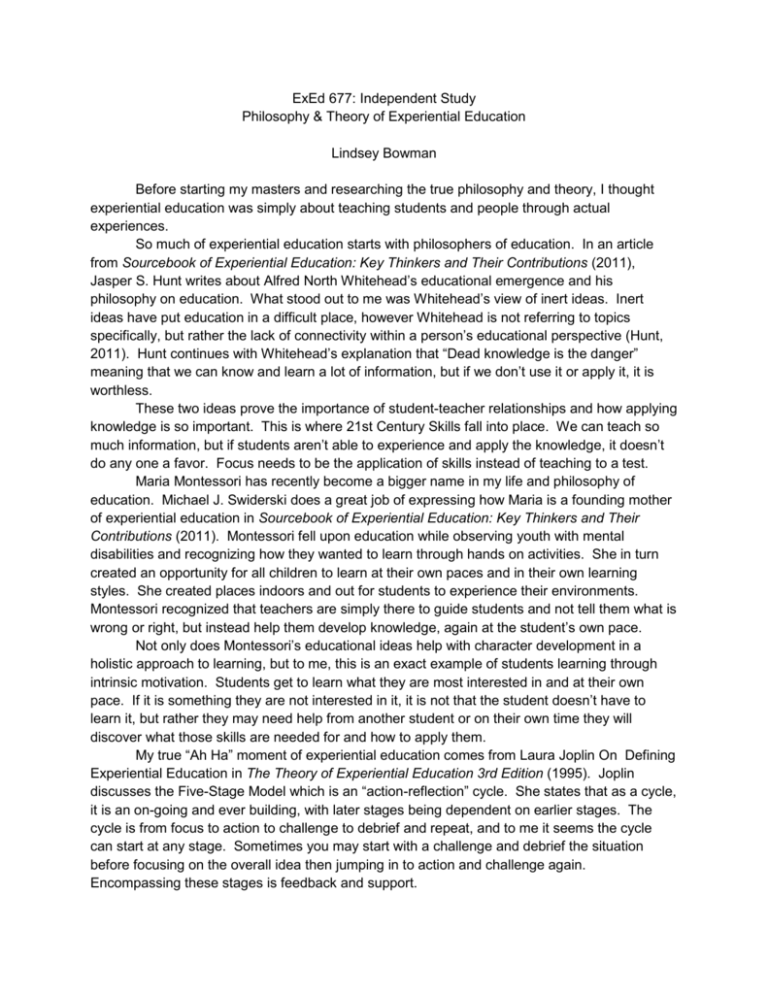
ExEd 677: Independent Study Philosophy & Theory of Experiential Education Lindsey Bowman Before starting my masters and researching the true philosophy and theory, I thought experiential education was simply about teaching students and people through actual experiences. So much of experiential education starts with philosophers of education. In an article from Sourcebook of Experiential Education: Key Thinkers and Their Contributions (2011), Jasper S. Hunt writes about Alfred North Whitehead’s educational emergence and his philosophy on education. What stood out to me was Whitehead’s view of inert ideas. Inert ideas have put education in a difficult place, however Whitehead is not referring to topics specifically, but rather the lack of connectivity within a person’s educational perspective (Hunt, 2011). Hunt continues with Whitehead’s explanation that “Dead knowledge is the danger” meaning that we can know and learn a lot of information, but if we don’t use it or apply it, it is worthless. These two ideas prove the importance of student-teacher relationships and how applying knowledge is so important. This is where 21st Century Skills fall into place. We can teach so much information, but if students aren’t able to experience and apply the knowledge, it doesn’t do any one a favor. Focus needs to be the application of skills instead of teaching to a test. Maria Montessori has recently become a bigger name in my life and philosophy of education. Michael J. Swiderski does a great job of expressing how Maria is a founding mother of experiential education in Sourcebook of Experiential Education: Key Thinkers and Their Contributions (2011). Montessori fell upon education while observing youth with mental disabilities and recognizing how they wanted to learn through hands on activities. She in turn created an opportunity for all children to learn at their own paces and in their own learning styles. She created places indoors and out for students to experience their environments. Montessori recognized that teachers are simply there to guide students and not tell them what is wrong or right, but instead help them develop knowledge, again at the student’s own pace. Not only does Montessori’s educational ideas help with character development in a holistic approach to learning, but to me, this is an exact example of students learning through intrinsic motivation. Students get to learn what they are most interested in and at their own pace. If it is something they are not interested in it, it is not that the student doesn’t have to learn it, but rather they may need help from another student or on their own time they will discover what those skills are needed for and how to apply them. My true “Ah Ha” moment of experiential education comes from Laura Joplin On Defining Experiential Education in The Theory of Experiential Education 3rd Edition (1995). Joplin discusses the Five-Stage Model which is an “action-reflection” cycle. She states that as a cycle, it is an on-going and ever building, with later stages being dependent on earlier stages. The cycle is from focus to action to challenge to debrief and repeat, and to me it seems the cycle can start at any stage. Sometimes you may start with a challenge and debrief the situation before focusing on the overall idea then jumping in to action and challenge again. Encompassing these stages is feedback and support. This was my “Ah Ha” moment because I was able to recognize how students are learning through their experiences. They can focus on an idea, make an action in a challenging situation using skills and knowledge and developing their critical thinking, then debriefing their learning and ideas when completed, or continue the cycle to push the project/learning to a higher level. While all of this is happening, support and feedback from other students and teachers is helpful to the student, but like Montessori believes, as a teacher, I am not here to give a grade, but rather to guide and improve the level of learning. Through my research on the philosophy and theor of experiential education as well as my own learning in courses, I have found the meaning of experiential education is so much more in depth. Not only have I learned about ways to teach experiential education, I have found the true meaning and history behind experiential education. I now know how to be a teacher through observation instead of direct instruction. I have read and understand the development of experiential education as it once was, what it is today, and that it is always changing. I want to be a part of that change and will always do my best to benefit my students in their education. Sources: Smith, Thomas E., Knapp, Clifford E. (Editors) (2011). Sourcebook of Experiential Education: Key Thinkers and Their Contributions. New York, NY: Taylor & Francis. Warren, Karen, Sakofs, Mitchel, Hunt, Jasper S. Jr, (Editors) (1995). The Theory of Experiential Education 3rd Edition. Dubuque, IA: Kendal/Hunt Publishing Company.

